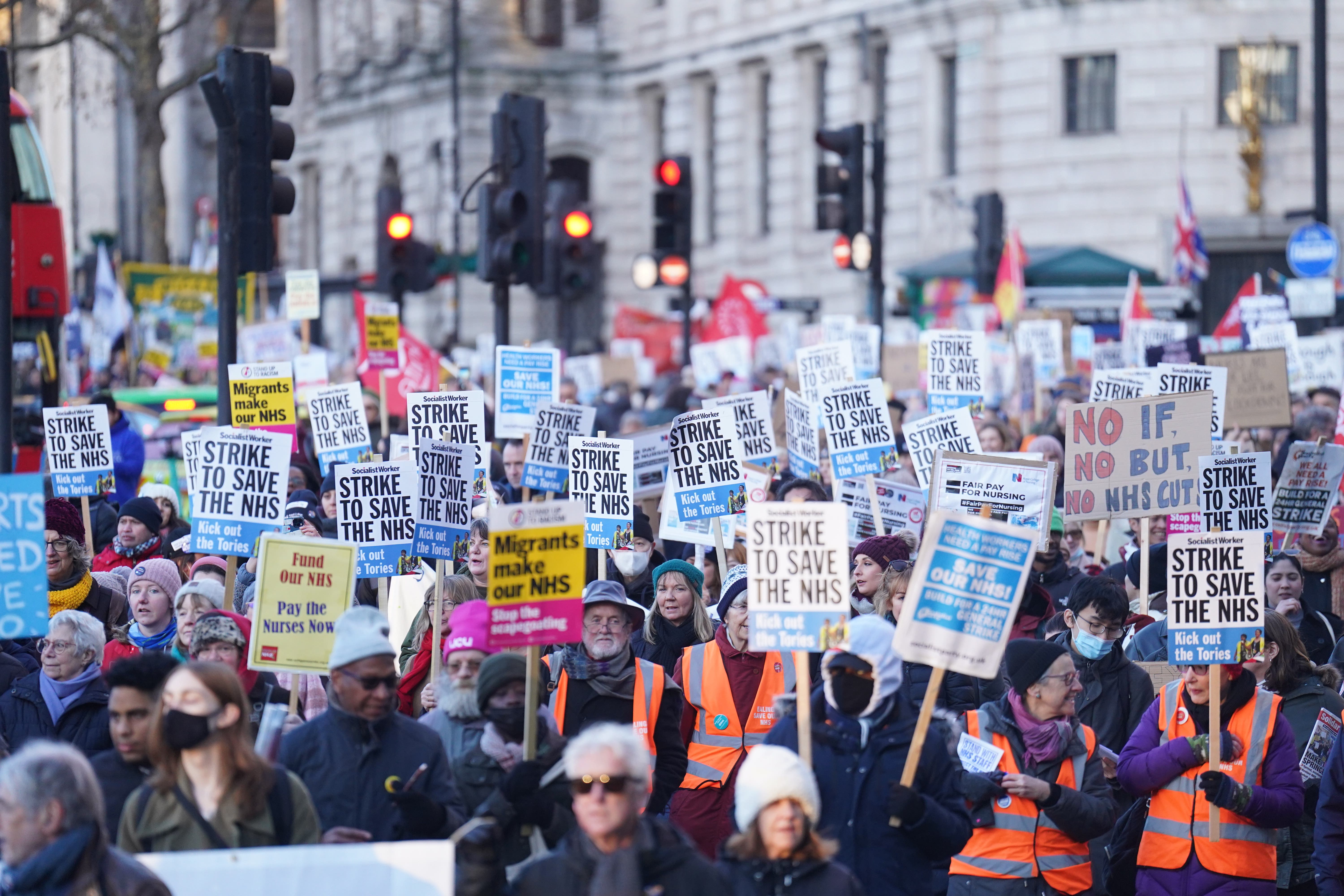Do you have to strike if your union strikes?
Britain set to face further industrial action across multiple sectors in February as wage talks go unresolved
Britain has been hit by a huge wave of industrial action this winter as members of multiple trade unions head to the picket lines arguing for improved wages and better working conditions.
Train drivers, nurses, ambulance staff, civil servants, bus drivers and Border Force agents are among those who have downed tools and reached for their placards to campaign for fairer salaries amid soaring inflation rates and the cost of living crisis.
Talks between government negotiators and union representatives have borne little fruit so far, however, as Rishi Sunak’s administration attempts to take a tough stance, insisting that the money for better deals is simply not there because of the current economic storm.
A majority of the British public continues to support the strikers, despite the widespread disruption, particularly over the Christmas holidays.
For all that has played out over the last few months, many may still not be familiar with the mechanics of industrial action.
Strikes occur whenever a trade union representing members of a particular profession falls into dispute with employers over a given issue and cannot reach a resolution by negotiation.
The union can then order its members to down tools and demonstrate on picket lines – but only after its membership has been balloted on the question and a majority has voted in favour of taking such action.
Without a properly organised postal vote, with ballots returned in prepaid envelopes, the legal rights and protections members expect to enjoy might not apply, potentially leaving them exposed to repercussions including dismissal.
“Before organising a ballot, a union must decide which members affected by a dispute it wants to ask to take industrial action,” the UK government explains on its website. “It must tell all members entitled to vote and the employer what the ballot results were.”
Should a strike be approved, union officials must then inform the employer of precisely when it will be and how it will affect services, with notice required at least 14 days in advance (unless they can agree on just seven).
For the individual, your membership of the union entitles you to vote on whether or not to go ahead with the strike – which negotiators believe is in the best interest of the workers’ cause – giving you a say on whether or not it happens.
You have the right to participate in a strike and cannot be forced to stay at or return to work while industrial action is ongoing (unless, that is, the necessary ballot was not properly conducted).
Equally, you do not have to take part in a strike and cannot be disciplined by your union if you refuse, although such a decision could potentially create difficulties with colleagues opposed to your choice.
Non-union members who take part in legal, official strikes have the same rights as union members not to be dismissed as a result of taking action.

“As long as the industrial action is lawful, non-union members are allowed to go on strike and remain protected from dismissal,” Crystal Boyde, an employment lawyer at Thrive Law, told the BBC.
If you are dismissed by your employer or excluded or get expelled from your union as a result of participating or declining to participate, you can complain to an employment tribunal within 12 weeks of it occurring.
The government warns that, if you do take part in industrial action, you will probably be found to have broken your employment contract and your employer “is unlikely to pay for the work you didn’t do when you took industrial action” and “can sue you for breaking your contract (this doesn’t happen often).”
On the question of wages, according to UK law, employers do not have to pay staff who take part in industrial action.
“If workers take action short of a strike, and refuse to carry out part of their contractual work, this is called ‘partial performance’,” the government states.
“If you refuse to accept partial performance, you must tell employees that they should only attend work if they fulfil their contractual duties and if they do not fulfil the terms of their employment contract, you do not have to pay them.
“If you do accept partial performance, you must still pay employees for any work that they have done.”
On the possibility of pay deductions, the government says employers “should only deduct the amount that the employee would have earned” and “cannot deduct an employee’s pay if they were not supposed to be working on the day of the strike”.
In preparation for this eventuality, most unions keep a war chest in order to issue strikers with a small amount of “strike pay” to live on while they occupy picket lines.
Currently, 23 per cent of the UK workforce is part of a trade union, accounting for 6.4m people, according to official data, around half of the total in Ms Thatcher’s heyday of 1979, when 13.2m employers were represented by a union.
Join our commenting forum
Join thought-provoking conversations, follow other Independent readers and see their replies
Comments


Bookmark popover
Removed from bookmarks